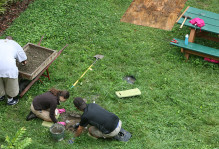Community Health and Community Capacity Building: Moving on
First, my apologies for the long hiatus. Much has happened since the last post, and I’m eager to report on developments in the Dominican Republic, Nicaragua, and more locally.
I find that I can’t start conversations about this work without cautions and caveats. My students and I remain ambivalent about the concept of service, and we continue to struggle with how to characterize our efforts. I was reminded recently of the dilemmas when I was asked to write about my experiences with and perspectives on service. Here is a rough summary of what I wrote
In the hills of Oklahoma where my grandparents lived, there was an expression that struck fear in all who heard it: “We’re from the government and we’re here to help you.” It was not just government workers who were the object of suspicion but all those with seemingly good intentions but little local knowledge. I did not need training in sociology to become suspicious of good intentions, but that training has honed my appreciation for the complexity of human and community needs, problems, and solutions. I am not fond of the word service because it comes with complicated baggage (never mind the denotations). I believe that H. L. Mencken had it right: “There is always an easy solution to every human problem–neat, plausible, and wrong.”
I believe in the power of knowledge and in trying to use knowledge to make a positive difference in the world.
The work in Paraiso and Nicaragua continues at a promising pace as we develop baseline understandings of the communities, cultures, interpersonal networks, and “local knowledge.” Even that observation, however, provokes some fear and dread for me. Some know that, in a different lifetime, I did a stint in military intelligence during the Viet Nam war. We spoke in that context, as we have begun to do again more recently in Iraq and Afghanistan, of “winning hearts and minds.” The strategies then, and I suspect now, look fairly similar to what we’re attempting in the Dominican Republic. Indeed, it occurs to me that whether I intended to start a revolution or gain information to help manage, control, or oppress a community or nation, I would use very much the strategies that we employ: basic descriptive ethnographic research, followed by networks analysis, followed by nurturing and facilitating local leadership. And so I am prompted to repeat one of our mantras: Good intentions are dangerous things.
We should question our own motives and the consequences of our efforts at every moment. We should expect and invite people in the communities where we work to do the same. Just below the surface, that is precisely what has happened in Paraiso this summer. Four students worked in the sub-community of Esfuerzo: Mohammad Torabinejad (3rd year on the team; co-leader); John Pothen (2nd year on the team); Usmaan Bashir (recently graduated; 1st-year team member); and Giulianna Morales (1st year — genuine newbie!). “Mo” was in Paraiso most of the summer, returning for the third summer of field research. John Pothen was there for only a few weeks less; Usmaan worked with the research team for about a month; and Giulianna was there for about two weeks. She has the distinction of being the first SOMOS team member to participate in summer research BEFORE having participated in the regular winter project trip.
Several worked behind the scenes in Williamsburg, helping with data analysis, the development of research protocols, and doing background library research, including Jake Milnor, Daniela Gutierrez, and Giulianna. Jake played a leading role in helping to develop and translate the current interview protocol, which focuses on both identifying and nurturing local “task groups” that might be supported in efforts to take on small-scale efforts to address underlying causes of persistent health problems. Giulianna was involved deeply in analyzing data for our “networks” study and helped with translating the interview protocol before leaving for Paraiso. Daniela has been busy recovering, translating, and ordering data from previous project research efforts.
Meanwhile, the Nicaragua project team (Students for Healthy Communities – for now, but watch this space for further announcements!) made enormous progress with background research. Supported in part by a small Reves Center fellowship, Gabriella Arias completed a study of the political history of the region where we work, including an analysis of the Sandinista movement and it’s likely effects on the community. Soyoung Hwang organized our photographic and video files, and developed a proposal for better representing our project (in name, logo, and other representations). Molly Copeland took on the task of examining the literature on community alienation and efficacy and prepared a presentation and paper on how we should expand our efforts to understand the culture and social structure of Cuje.
We will hit the ground running this fall. Both projects are doing extraordinary work and the model of “community capacity building” to improve health and health care is moving forward steadily. We are considering a “domestic” version of the projects. Amy Haldeman, a W&M alum who followed the project closely but never participated and a graduate student in Public Policy, worked with me this summer to develop and write a proposal. She examined the work and results of SOMOS and SHC; read literature on community health projects; examined statutory issues with respect to provider liability; met with administrators and providers in outreach clinics; researched the prospects for “loan forgiveness” programs for recent med school graduates; and drafted a business plan to capture the model, approach, prospects, and limitations of our efforts.
The new academic year is about to start, and I can’t wait.


No comments.
Comments are currently closed. Comments are closed on all posts older than one year, and for those in our archive.